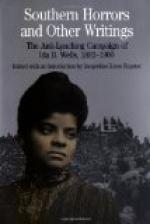The lesson this teaches and which every Afro-American should ponder well, is that a Winchester rifle should have a place of honor in every black home, and it should be used for that protection which the law refuses to give. When the white man who is always the aggressor knows he runs as great risk of biting the dust every time his Afro-American victim does, he will have greater respect for Afro-American life. The more the Afro-American yields and cringes and begs, the more he has to do so, the more he is insulted, outraged and lynched.
The assertion has been substantiated throughout these pages that the press contains unreliable and doctored reports of lynchings, and one of the most necessary things for the race to do is to get these facts before the public. The people must know before they can act, and there is no educator to compare with the press.
The Afro-American papers are the only ones which will print the truth, and they lack means to employ agents and detectives to get at the facts. The race must rally a mighty host to the support of their journals, and thus enable them to do much in the way of investigation.
A lynching occurred at Port Jarvis, N.Y., the first week in June. A white and colored man were implicated in the assault upon a white girl. It was charged that the white man paid the colored boy to make the assault, which he did on the public highway in broad day time, and was lynched. This, too was done by “parties unknown.” The white man in the case still lives. He was imprisoned and promises to fight the case on trial. At the preliminary examination, it developed that he had been a suitor of the girl’s. She had repulsed and refused him, yet had given him money, and he had sent threatening letters demanding more.
The day before this examination she was so wrought up, she left home and wandered miles away. When found she said she did so because she was afraid of the man’s testimony. Why should she be afraid of the prisoner! Why should she yield to his demands for money if not to prevent him exposing something he knew! It seems explainable only on the hypothesis that a liaison existed between the colored boy and the girl, and the white man knew of it. The press is singularly silent. Has it a motive? We owe it to ourselves to find out.
The story comes from Larned, Kansas, Oct. 1, that a young white lady held at bay until daylight, without alarming any one in the house, “a burly Negro” who entered her room and bed. The “burly Negro” was promptly lynched without investigation or examination of inconsistant stories.
A house was found burned down near Montgomery, Ala., in Monroe County, Oct. 13, a few weeks ago; also the burned bodies of the owners and melted piles of gold and silver.
These discoveries led to the conclusion that the awful crime was not prompted by motives of robbery. The suggestion of the whites was that “brutal lust was the incentive, and as there are nearly 200 Negroes living within a radius of five miles of the place the conclusion was inevitable that some of them were the perpetrators.”




